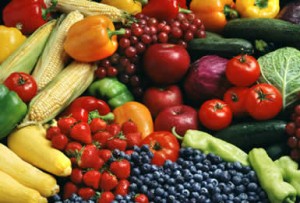We all know that the Mediterranean Sea and all the countries surrounding it have long and hot summers with high degree of sunshine. The diet of the Mediterranean nations, the Mediterranean diet, has been such that offered the people the necessary sun protection.
The Mediterranean diet involves such foods that can protect effectively our skin from diseases and harms caused by our exposure in the sun and the ultraviolet radiation. The Mediterranean foods containing antioxidants, antioxidant vitamins, fatty acids and liquids are those foods that will protect us against the dangerous sunrays.
It has been proven that the sun protection is not only achieved with sun protecting creams but this can also be achieved with the right diet. According to the specialists, the right diet can contribute to the protection of the skin cells from the sun radiation, especially the hot summer days that most us spend a lot of time at the beach and or the pool.
Antioxidants
 According to recent studies, the addition, to our everyday diet, of foods that have antioxidants and vitamins protects our skin from the harmful effects caused by the ultraviolet radiation. More specifically, the vitamins with antioxidant effect, A, C and E, together with antioxidant substances such as carotenoids and flavonoids, protect the skin from the changes caused by the long exposure to the sun. It has to be noted that for best protection these substances should be combined and mixed so that the effect of the one reinforces that positive effect of the other. These antioxidants quarantine and fight the substances produced from the sun radiation and which, if left free, cause the skin damages and diseases which in some cases are cancerous and may lead to death.
According to recent studies, the addition, to our everyday diet, of foods that have antioxidants and vitamins protects our skin from the harmful effects caused by the ultraviolet radiation. More specifically, the vitamins with antioxidant effect, A, C and E, together with antioxidant substances such as carotenoids and flavonoids, protect the skin from the changes caused by the long exposure to the sun. It has to be noted that for best protection these substances should be combined and mixed so that the effect of the one reinforces that positive effect of the other. These antioxidants quarantine and fight the substances produced from the sun radiation and which, if left free, cause the skin damages and diseases which in some cases are cancerous and may lead to death.
Mediterranean foods with Antioxidants and sun protection properties
There are plenty of foods with the right antioxidants that can fortify our body and skin and protect us from the sun. Such Mediterranean foods are:
- Animal produce such as eggs, dairy products and liver
- Fruits, and mainly citrus fruits, grapes, strawberries, cherries and berries
- Green vegetables such as lettuce and spinach, carrots, green peppers, onions and tomatoes
- Olive oil and sesame oil
- Dry Nuts and more specifically almond and walnuts.
- Red wine
Polyunsaturated Fatty acids
Another important food category with the so called ‘’photo protective’’ properties are the polyunsaturated fatty acids. These fatty acids play an important role in the sun protecting capabilities of our skin, as they regulate the close and positive cooperation of the various cells and membranes and the biosynthesis of the lipids of the stratum corneum of the skin.
Where do we find polyunsaturated fatty acids?
Polyunsaturated fatty acids can be found in the following food types and categories
- Fatty fish such as salmon, mackerel and sea bream
- Dry nuts such as walnuts, almonds and peanuts
Other ‘’sun protecting’’ foods
Cereal: Cereal contains selenium and recent research has shown that selenium reduces the possibilities for sun burns and skin deterioration due to exposure to the sun. In addition it slows down the ageing of the skin by maintaining its elasticity. It is has also been found that selenium is an important factor in the prevention of skin cancer. It should be noted that selenium is also contained in tuna.
Sunflower seeds: Sunflower seeds have vitamin E that protects the cell membranes and prevents the harm that may be caused by the ultraviolet rays. The same studies have shown the protective effect of vitamins E is even more when combined with vitamins C. In addition to the sunflower seeds, vitamin E can be found in olive oil, almonds and hazelnuts.
During the summer period the increased sweating results to the loss of water from the body with a possible upset of the balance of the liquids of the skin and the layers under the skin. This is the reason we have to consume a lot of liquids during the summer. In the liquids category we not only have water but juices from fruits and vegetables. In addition and of particular importance we must consume whole fresh fruits and vegetables since they not only contain liquids but they also contain the necessary metal salts and other substances that are necessary to be replaced.
As we can infer from this and other articles, the structure and composition of the Mediterranean diet helps in many and different ways of our everyday life and it is certainly not the creation of a person or a group of people but the outcome, through the centuries, of the everyday life of the Mediterranean way of living.














{ 0 comments… add one now }